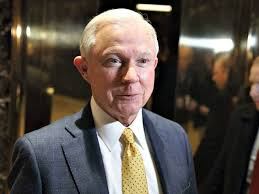Our good friends at The Trace have responded to the confirmation of Jeff Sessions as the People’s Lawyer by running a detailed analysis of how he prosecuted gun cases during 1993, the last year of his tenure as U.S. Attorney in Mobile. During his recent confirmation hearings Sessions came down hard on prosecuting gun crimes, citing a Federal sentencing statute which calls for a mandatory, five-year prison term for someone who commits a violent crime with a gun. And the gun sentence doesn’t run concurrent with the sentence for the violent crime itself – it’s tacked on after the other sentence has been served.
 The study published in The Trace covered 70 gun cases that went through Sessions’ office in 1993, of which 19 were tied directly to a violent crime and thus might have become what prosecutors call a ‘tack-on’ charge, which is often used as a threat to get a defendant to cop a guilty plea. His office also charged drug dealers with being ‘repeat offenders’ if they carried a gun during multiple drug sales on the same day, and these charges often resulted in sentences of between 25 years to life.
The study published in The Trace covered 70 gun cases that went through Sessions’ office in 1993, of which 19 were tied directly to a violent crime and thus might have become what prosecutors call a ‘tack-on’ charge, which is often used as a threat to get a defendant to cop a guilty plea. His office also charged drug dealers with being ‘repeat offenders’ if they carried a gun during multiple drug sales on the same day, and these charges often resulted in sentences of between 25 years to life.
Now here’s where things get a little sticky, both in terms of what a detailed analysis of these gun cases shows, as well as how Dan Friedman, who wrote the piece for The Trace, chose to explain what went down. Of the 70 gun cases prosecuted by Sessions in 1993, 25 were for a felon who had possession of a gun, which is a violation of the gun-control law of 1968. Most of these individuals were not charged with any other crime, some got reduced sentences by copping a plea, others served three years or more.
Friedman’s article suggests that the surge in the number of felons-in-possession cases wasn’t tied directly to an increase in violent crime, but was simply a way for Sessions and other U.S. Attorneys to ‘pad’ their caseloads with more successful prosecutions which meant more people serving more time in jail. He notes that when Geoffrey Holder became Attorney General under Obama, he told federal prosecutors to relax the guidance on chasing and convicting defendants of gun charges, no doubt a reflection of concerns about the rising incarceration rates, in particular the incarceration of blacks. The result, according to Freidman, is that federal firearms-violations cases dropped from 11,067 in 2004 to 8,528 in 2015.
Friedman’s article concludes with a statement from Professor Daniel Richman who teaches law at Columbia University and previously served as a federal prosecutor for the Federal District of New York. “Gun prosecutions can cover a range of people,” says Richman, “you are getting someone with a gun and that’s something, but the likely effect on violence is far from clear.” Which was perhaps one of the reasons that motivated Holder to relax the aggressive prosecution of gun cases during his tenure in D.C.
So I decided to test Richman’s theory about what happens when we ‘get tough’ on gun crime, which is clearly uppermost in the mind of the new Attorney General, as well as his boss who ranted endlessly about protecting America from the criminal hordes during the 2016 campaign. Know how many homicides were committed in Mobile in 1992, the year before Sessions really cracked down on guys who were walking around with illegal guns? There were 35 homicides in Mobile, of which at least half were committed with guns. Know how many homicides occurred in Mobile in 1993, when Sessions was locking up everyone who was found with an illegal gun? The homicide number for that year was 42 and every other violent crime category was either significantly down from the previous year or remained the same.
In other words, while Sessions was busily locking up all the criminals with guns, more people in Mobile ended up getting killed. So if there’s any connection between getting ‘tough’ on illegal guns and violent crime, it might be exactly the reverse of what Sessions, Trump and the NRA have said. Hmmmmmmm….
Feb 15, 2024 @ 19:54:26
I heard once that the odds of winning the Lottery are the same whether you buy a ticket or not. That is overstating the matter, but only slightly. The effect on violent crime appears to be the same whether gun laws are enforced or not. Or never passed at all. Or changed to be more lenient. So, what are people of good will supposed to do? I think that there is a lot of good that can be done, but it will not be helped along by making law-abiding people into criminals because they own guns.